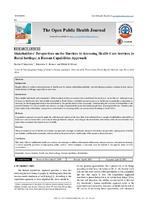| dc.contributor.author | Chinyakata, Rachel | |
| dc.contributor.author | Roman, Nicolette V. | |
| dc.contributor.author | Msiza, Fikile B. | |
| dc.date.accessioned | 2022-03-10T08:37:07Z | |
| dc.date.available | 2022-03-10T08:37:07Z | |
| dc.date.issued | 2021-04-12 | |
| dc.identifier.citation | Chinyakata, Rachel, et al. “Stakeholders’ Perspectives on the Barriers to Accessing Health Care Services in Rural Settings: A Human Capabilities Approach.” The Open Public Health Journal, vol. 14, no. 1, 2021, pp. 336–44, https://doi.org/10.2174/1874944502114010336. | en_US |
| dc.identifier.issn | 18749445 | |
| dc.identifier.uri | 10.2174/1874944502114010336 | |
| dc.identifier.uri | http://hdl.handle.net/10566/7311 | |
| dc.description.abstract | Despite efforts to achieve universal access to health care by various stakeholders globally, most developing countries continue to face serious health delivery challenges, especially in rural areas. Introduction: These inhibit individuals and communities’ ability to obtain health care services when needed and the freedom to use health care. Although issues of access to health care have been widely researched in South Africa, a detailed account on access to health care in particular communities is necessary for developing interventions that are tailored to the specific needs of that community. Understanding the accounts of stakeholders to the perceived barriers to access to health care services can help comprehend the issues that hinder people from accessing health care. Therefore, this study explored the stakeholders’ perspectives on the barriers to accessing health care services in rural settings in South Africa. Methods: A qualitative approach was used to guide the collection and analysis of the data. Data were collected from a sample of stakeholders selected from three rural areas in South Africa and analysed through thematic analysis. According to the stakeholders interviewed, there are some barriers that exist in the community that impede access to health. Reusults: These are limited or lack of health care facilities and personnel, shortages of medicine, distrust in the health care providers, opening hours of health care facilities and financial constraints, which resulted in the perceived poor health status of the people in those rural areas. Conclusion: This study calls for multifaceted health care reforms and strategies to address infrastructure deficiencies, human resources and medicine shortages to ensure equitable provision of high-quality public services. These strategies or measures must be tailored to the specific needs of rural communities. © 2021 Chinyakata et al. | en_US |
| dc.description.sponsorship | National Research Foundation (118551, 118581 and 115460). | en_US |
| dc.language.iso | en | en_US |
| dc.publisher | Bentham Science Publishers | en_US |
| dc.relation.ispartofseries | The Open Public Health Journal;vol. 14, no. 1, 2021, pp. 336–44, | |
| dc.subject | Access | en_US |
| dc.subject | Barriers | en_US |
| dc.subject | Health care | en_US |
| dc.subject | Human capabilities | en_US |
| dc.subject | Rural settings | en_US |
| dc.subject | Stakeholders | en_US |
| dc.title | Stakeholders’ perspectives on the barriers to accessing health care services in rural settings: A human capabilities approach | en_US |
| dc.type | Article | en_US |

